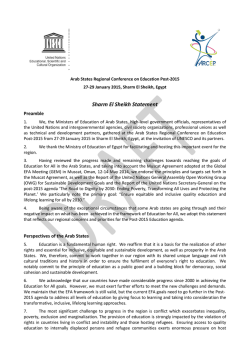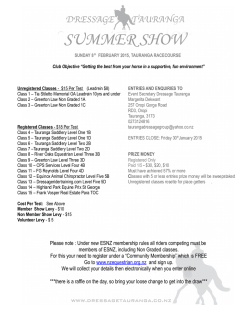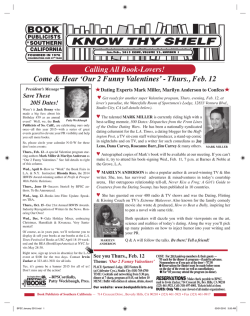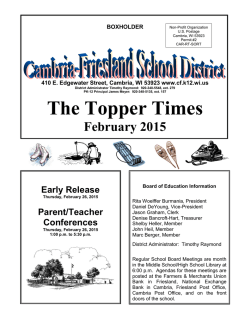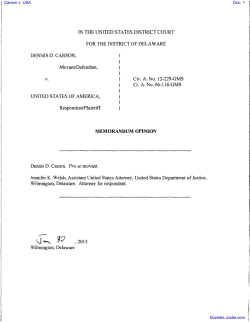
the Ninth Circuit issued an opinion
Case: 12-15029, 01/30/2015, ID: 9402230, DktEntry: 70-1, Page 1 of 12 FOR PUBLICATION UNITED STATES COURT OF APPEALS FOR THE NINTH CIRCUIT LOGAN R. VOLPICELLI, Plaintiff-Appellant, v. No. 12-15029 D.C. No. 3:10-cv-00548RCJ-RAM UNITED STATES OF AMERICA, Defendant-Appellee. OPINION Appeal from the United States District Court for the District of Nevada Robert Clive Jones, District Judge, Presiding Argued and Submitted October 7, 2014—San Francisco, California Filed January 30, 2015 Before: William A. Fletcher and Paul J. Watford, Circuit Judges, and Kevin Thomas Duffy, District Judge.* Opinion by Judge Watford * The Honorable Kevin Thomas Duffy, District Judge for the U.S. District Court for the Southern District of New York, sitting by designation. Case: 12-15029, 01/30/2015, ID: 9402230, DktEntry: 70-1, Page 2 of 12 2 VOLPICELLI V. UNITED STATES SUMMARY** Tax Reversing the district court’s dismissal of an action alleging that the IRS wrongfully levied upon funds that did not belong to the plaintiff, the panel reaffirmed its prior holding that the nine-month limitations period set by 26 U.S.C. § 6532(c) is not jurisdictional and may be equitably tolled. Because the district court dismissed the action without determining whether the plaintiff has established grounds for equitable tolling, the panel left that question for the district court to resolve on remand. COUNSEL Brian P. Goldman (argued) and George G. Wolf, Orrick, Herrington & Sutcliffe LLP, San Francisco, California; Mark S. Davies, Orrick, Herrington & Sutcliffe LLP, Washington, D.C., for Plaintiff-Appellant. Joan I. Oppenheimer (argued), Attorney; Kathryn Keneally, Assistant Attorney General; John A. Nolet, Attorney, Department of Justice, Tax Division, Washington, D.C.; Daniel G. Bogden (of counsel), United States Attorney for the District of Nevada, for Defendant-Appellee. ** This summary constitutes no part of the opinion of the court. It has been prepared by court staff for the convenience of the reader. Case: 12-15029, 01/30/2015, ID: 9402230, DktEntry: 70-1, Page 3 of 12 VOLPICELLI V. UNITED STATES 3 Carlton M. Smith, Director, Benjamin N. Cardozo School of Law Tax Clinic, New York, New York, for Amicus Curiae. OPINION WATFORD, Circuit Judge: The plaintiff in this case, Logan Volpicelli, sued the Internal Revenue Service for wrongfully seizing roughly $13,000 that Volpicelli says belonged to him. The IRS thought the money belonged to Volpicelli’s father and, upon seizing it, applied the funds to pay down the father’s tax debts. At the time of the seizure (known as a levy), Volpicelli was 10 years old. He alleges that he did not find out about the levy until after he turned 18. A short time later, Volpicelli filed this action under 26 U.S.C. § 7426(a)(1), which provides a cause of action and waives the United States’ sovereign immunity for claims alleging wrongful levy.1 1 Section 7426(a)(1) provides: Wrongful levy.—If a levy has been made on property or property has been sold pursuant to a levy, any person (other than the person against whom is assessed the tax out of which such levy arose) who claims an interest in or lien on such property and that such property was wrongfully levied upon may bring a civil action against the United States in a district court of the United States. Such action may be brought without regard to whether such property has been surrendered to or sold by the Secretary. Case: 12-15029, 01/30/2015, ID: 9402230, DktEntry: 70-1, Page 4 of 12 4 VOLPICELLI V. UNITED STATES The problem for Volpicelli: Ordinarily, a suit for wrongful levy must be brought no later than nine months after the levy occurs. 26 U.S.C. § 6532(c).2 Volpicelli filed his action more than eight years after the levy occurred. The government, as might be expected, moved to dismiss Volpicelli’s action as untimely. In response, Volpicelli conceded his failure to meet the statutory filing deadline but argued that the deadline should be equitably tolled until he reached the age of majority. (If Volpicelli prevails on this point, the government agrees that his suit is not time-barred.) The district court concluded that § 6532(c)’s time limit may not be equitably tolled and granted the government’s motion to dismiss. The only issue on appeal is whether the district court correctly held that § 6532(c) is not subject to equitable tolling. As it happens, we decided that very issue almost two 2 Section 6532(c) provides: Suits by persons other than taxpayers.— (1) General rule.—Except as provided by paragraph (2), no suit or proceeding under section 7426 shall be begun after the expiration of 9 months from the date of the levy or agreement giving rise to such action. (2) Period when claim is filed.—If a request is made for the return of property described in section 6343(b), the 9-month period prescribed in paragraph (1) shall be extended for a period of 12 months from the date of filing of such request or for a period of 6 months from the date of mailing by registered or certified mail by the Secretary to the person making such request of a notice of disallowance of the part of the request to which the action relates, whichever is shorter. Case: 12-15029, 01/30/2015, ID: 9402230, DktEntry: 70-1, Page 5 of 12 VOLPICELLI V. UNITED STATES 5 decades ago. In 1995, we held that § 6532(c) is subject to equitable tolling. Supermail Cargo, Inc. v. United States, 68 F.3d 1204, 1206–07 (9th Cir. 1995); Capital Tracing, Inc. v. United States, 63 F.3d 859, 861–62 (9th Cir. 1995). One might think that should be that. As a three-judge panel, we are bound by those decisions unless they’re “clearly irreconcilable” with intervening higher authority. Miller v. Gammie, 335 F.3d 889, 893 (9th Cir. 2003) (en banc). The government contends that higher authority has intervened, and in one sense we agree. When we decided Supermail Cargo and Capital Tracing, the Supreme Court’s controlling decision in Irwin v. Department of Veterans Affairs, 498 U.S. 89 (1990), stood essentially alone. Irwin rejected the then-prevailing rule, under which time limits set by Congress for suits against the government were deemed jurisdictional and therefore not subject to equitable tolling. See United States v. Kubrick, 444 U.S. 111, 117 (1979); Soriano v. United States, 352 U.S. 270, 275–76 (1957). Irwin replaced that rule with a rebuttable presumption that filing deadlines may be equitably tolled, unless Congress provides otherwise. 498 U.S. at 95–96. In Supermail Cargo and Capital Tracing, we applied Irwin’s presumption to § 6532(c) and, implicitly at least, found nothing in the statute’s text to rebut the presumption. Supermail Cargo, 68 F.3d at 1206–07; Capital Tracing, 63 F.3d at 861. As the government correctly points out, Irwin no longer stands alone: Recent Supreme Court decisions have placed new limits on the circumstances in which Irwin’s presumption applies. But that does not mean we are free to analyze the availability of equitable tolling under § 6532(c) without regard to what Supermail Cargo and Capital Tracing previously held. All we may do—and all we undertake to do Case: 12-15029, 01/30/2015, ID: 9402230, DktEntry: 70-1, Page 6 of 12 6 VOLPICELLI V. UNITED STATES here—is decide whether the reasoning of our earlier precedents is “clearly irreconcilable” with the reasoning of the Supreme Court’s intervening decisions. Miller, 335 F.3d at 893. The government’s arguments suggest three independent ways that might be the case. First, the government notes that, although Irwin suggested its rebuttable presumption would apply across the board to all filing deadlines, the Supreme Court has since clarified that the presumption does not apply to deadlines that are “jurisdictional.” See Sebelius v. Auburn Reg’l Med. Ctr., 133 S. Ct. 817, 824–25 (2013). In Supermail Cargo and Capital Tracing, we held that the filing deadline set by § 6532(c) is not jurisdictional. The government argues that intervening Supreme Court authority has rendered that conclusion erroneous, and if the government were right, we would be compelled to treat Supermail Cargo and Capital Tracing “as having been effectively overruled.” Miller, 335 F.3d at 893. But the government is not right. The Supreme Court’s recent cases require a clear statement from Congress before a procedural rule will be treated as jurisdictional. Auburn, 133 S. Ct. at 824; Henderson ex rel. Henderson v. Shinseki, 131 S. Ct. 1197, 1203 (2011). We find no such clear statement here. Section 6532(c) does not cast its filing deadline in “jurisdictional” terms any more than the statute at issue in Henderson did—a statute the Court held to be nonjurisdictional. See Henderson, 131 S. Ct. at 1204–05. Congress signaled the non-jurisdictional nature of § 6532(c) by placing it in a subtitle of the Internal Revenue Code labeled “Procedure and Administration,” while at the same time enacting a separate jurisdiction-conferring provision (28 U.S.C. § 1346(e)) and placing that provision in a chapter Case: 12-15029, 01/30/2015, ID: 9402230, DktEntry: 70-1, Page 7 of 12 VOLPICELLI V. UNITED STATES 7 titled “District Courts; Jurisdiction.” Congress’ placement decision indicates that it viewed § 6532(c)’s limitations period as a mere “claim-processing rule” rather than a jurisdictional command. See Henderson, 131 S. Ct. at 1205. In an attempt to refute this conclusion, the government cites one relevant Supreme Court case that deemed a limitations period jurisdictional, but the Court relied primarily upon considerations of stare decisis specific to the statute at issue there. John R. Sand & Gravel Co. v. United States, 552 U.S. 130, 137–39 (2008). The government also contends that § 6532(c)’s filing deadline must be deemed jurisdictional because Congress imposed it as a condition on the United States’ waiver of sovereign immunity. The Supreme Court necessarily rejected that argument in Irwin. The Court acknowledged that the statute of limitations at issue there was “a condition to the waiver of sovereign immunity and thus must be strictly construed,” but the Court nonetheless found the limitations period subject to equitable tolling. Irwin, 498 U.S. at 94, 95–96. Consequently, even if § 6532(c)’s limitations period were a condition on the United States’ waiver of sovereign immunity, that fact alone would not render it “jurisdictional” for purposes of deciding whether the Irwin presumption applies. Second, the government argues that, even if § 6532(c) is not jurisdictional, Irwin’s presumption may be applied only if the claim asserted against the government is analogous to a claim that could be asserted against a private party. We held that such a requirement exists in Rouse v. United States Department of State, 567 F.3d 408, 416 (9th Cir. 2009), relying in part on dicta in United States v. Brockamp, 519 U.S. 347, 349–50 (1997). Although the government Case: 12-15029, 01/30/2015, ID: 9402230, DktEntry: 70-1, Page 8 of 12 8 VOLPICELLI V. UNITED STATES argues otherwise, Rouse is not in tension with the result we reached in Supermail Cargo and Capital Tracing. The search for a private-suit analogue is conducted at a “high level of generality,” Rouse, 567 F.3d at 416 (internal quotation marks omitted), and here such an analogue is easy to identify. Volpicelli’s wrongful levy suit seeks the return of money that he contends the IRS unlawfully took from him. That claim is akin to the traditional common law torts of conversion and trespass to chattels, claims that have long been asserted against private parties. See In re Emery, 317 F.3d 1064, 1069 (9th Cir. 2003); Restatement (Second) of Torts §§ 222, 222A (1965). Finally, the government contends that, even if the Irwin presumption applies to § 6532(c), three Supreme Court decisions require us to hold that the presumption has been rebutted, contrary to the conclusion we reached in Supermail Cargo and Capital Tracing. After carefully reviewing the cases the government cites, we don’t see anything in them that would allow us to overrule our prior decisions. The first and best case for the government is Brockamp. There, the Court applied Irwin’s presumption in deciding whether the time limits set by 26 U.S.C. § 6511 for filing tax refund suits may be equitably tolled. As to that limitations period, the Court concluded that Irwin’s presumption had been rebutted, relying on a combination of factors. The Court stressed that § 6511 sets forth its time limits in “unusually emphatic form” and in a “highly detailed technical manner, that, linguistically speaking, cannot easily be read as containing implicit exceptions.” 519 U.S. at 350. The statute itself specified at least six exceptions to the filing deadline, and equitable tolling was not among them. Id. at 351–52. Section 6511 also reiterated the applicable time limits “in Case: 12-15029, 01/30/2015, ID: 9402230, DktEntry: 70-1, Page 9 of 12 VOLPICELLI V. UNITED STATES 9 both procedural and substantive forms,” such that granting equitable tolling would “require tolling, not only procedural limitations, but also substantive limitations on the amount of recovery”—a kind of tolling for which the Court could find no direct precedent. Id. at 352. Section 6532(c) does not share these characteristics. True, its limitations period is set forth in emphatic language—“no suit or proceeding . . . shall be begun after the expiration of 9 months from the date of the levy”—but that language does not strike us as “unusually” emphatic. It seems no more emphatic than the language of the Antiterrorism and Effective Death Penalty Act’s limitations period, 28 U.S.C. § 2244(d), which provides that “[a] 1-year period of limitation shall apply to an application for a writ of habeas corpus”—language that the Court has said “reads like an ordinary, run-of-the-mill statute of limitations.” Holland v. Florida, 560 U.S. 631, 647 (2010). Nor is the language of § 6532(c) highly detailed or technical; in fact, it’s just the opposite. See note 2 above. The limitations period it establishes is purely procedural and has no substantive impact on the amount of recovery. And § 6532(c) does not contain numerous exceptions, as does § 6511. It has just one exception (if it can even be called that), which extends the limitations period if the plaintiff seeks administrative review before filing suit. 26 U.S.C. § 6532(c)(2). Given the stark differences between § 6511 and § 6532(c), we are not persuaded that Brockamp has effectively overruled Supermail Cargo and Capital Tracing. The government urges us to place overriding weight on one similarity that § 6511 and § 6532(c) do share: Both are found in the tax code. The government contends this shared feature is significant because the Brockamp Court observed, Case: 12-15029, 01/30/2015, ID: 9402230, DktEntry: 70-1, Page 10 of 12 10 VOLPICELLI V. UNITED STATES in the course of explaining why Congress did not intend to allow equitable exceptions to § 6511’s filing deadline, that “[t]ax law, after all, is not normally characterized by casespecific exceptions reflecting individualized equities.” 519 U.S. at 352. The Court may in time decide that Congress did not intend equitable tolling to be available with respect to any tax-related statute of limitations. But that’s not what the Court held in Brockamp. It instead engaged in a statutespecific analysis of the factors that indicated Congress did not want equitable tolling to be available under § 6511. The Court later made clear in Holland that the “‘underlying subject matter’” of § 6511—tax law—was only one of those factors. 560 U.S. at 646 (quoting Brockamp, 519 U.S. at 352). As we have explained, the other factors on which the Court relied are not a close enough fit with § 6532(c) to render Brockamp controlling here. The government next relies on United States v. Beggerly, 524 U.S. 38 (1998), where the Court held that Irwin’s presumption was rebutted with respect to the limitations period set by 28 U.S.C. § 2409a for claims under the Quiet Title Act. Key to the Court’s analysis of that statute were two factors absent from § 6532(c). First, the Quiet Title Act’s 12year limitations period was “unusually generous.” 524 U.S. at 48. The same cannot be said of § 6532(c)’s relatively stingy 9-month limitations period. Second, Congress had “already effectively allowed for equitable tolling” by providing that the 12-year limitations period does not begin to run until the plaintiff “‘knew or should have known of the claim of the United States.’” Id. (quoting 28 U.S.C. § 2409a(g)). Allowing equitable tolling on additional unenumerated grounds, the Court reasoned, was unwarranted. Id. at 49. No similar allowance for equitable tolling is built into the limitations period prescribed by § 6532(c). Thus, we Case: 12-15029, 01/30/2015, ID: 9402230, DktEntry: 70-1, Page 11 of 12 VOLPICELLI V. UNITED STATES 11 find nothing in Beggerly’s reasoning that has effectively overruled our decisions in Supermail Cargo and Capital Tracing. The government cites Sebelius v. Auburn Regional Medical Center, 133 S. Ct. 817 (2013), as a third case in which the Court held that Irwin’s presumption had been rebutted. We read the case differently. The time limit at issue there involved “an agency’s internal appeal deadline,” not a time limit for filing suit in court. Id. at 827. The Court concluded that “the equitable tolling presumption our Irwin decision approved for suits brought in court does not similarly apply to administrative appeals of the kind here considered.” Id. at 828–29. Instead of holding that Irwin’s presumption had been rebutted, the Court determined that the presumption did not apply in the first place. The Court’s holding does not undermine, much less overrule, our decisions in Supermail Cargo and Capital Tracing because § 6532(c) involves a limitations period to which Irwin’s presumption does apply.3 In sum, none of the Supreme Court’s intervening decisions is clearly irreconcilable with our 1995 precedents. We reaffirm our prior holding that the limitations period set by 26 U.S.C. § 6532(c) is not jurisdictional and may be equitably tolled. Supermail Cargo, 68 F.3d at 1206 n.2, 1207. Because the district court dismissed Volpicelli’s suit 3 We recognize that other circuits have held that § 6532(c)’s limitations period is not subject to equitable tolling. See Becton Dickinson & Co. v. Wolckenhauer, 215 F.3d 340, 351–52 (3d Cir. 2000) (collecting cases). Even if we agreed with the reasoning of those circuits (which we don’t), we would not be free to follow those decisions rather than our own binding precedent. Case: 12-15029, 01/30/2015, ID: 9402230, DktEntry: 70-1, Page 12 of 12 12 VOLPICELLI V. UNITED STATES without determining whether he has established grounds for equitable tolling, we leave that question for the district court to resolve in the first instance on remand. REVERSED AND REMANDED.
© Copyright 2026


